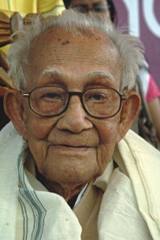Binod Bihari Chowdhury facts for kids
Quick facts for kids
Biplobi
Binod Bihari Chowdhury
|
|
|---|---|
 |
|
| Born | 10 January 1911 |
| Died | 10 April 2013 (aged 102) Kolkata, West Bengal, India
|
| Resting place | Chittagong, Bangladesh |
| Nationality | Bangladeshi |
| Education | Bachelor of Arts; Master of Arts; Bachelor of Law |
| Known for | Chittagong armoury raid |
| Title | Biplobi (Revolutionary), Agnipurush |
| Movement | Indian independence movement |
| Spouse(s) | Biva Das |
| Awards | Independence Day Award |
Binod Bihari Chowdhury (Bengali: বিনোদ বিহারী চৌধুরী; 10 January 1911 – 10 April 2013) was a brave freedom fighter and social worker. He was born in British India and later became a citizen of Bangladesh. He played a big part in the movement to free India from British rule.
Binod Bihari is best known for joining the Chittagong armoury raid in 1930. This was an armed fight led by Surya Sen to end the British colonial rule. Binod Bihari was the last person alive from this famous raid. He was also involved in many important events in the history of Bangladesh. In 2000, he received the Independence Day Award, which is the highest award a civilian can get in Bangladesh.
Contents
Early Life and Education
Binod Bihari Chowdhury was born on January 10, 1911. His birthplace was a village called Uttarvurshi in the Chittagong district. At that time, this area was part of British India. He was the fifth child of Kamini Kumar Chowdhury and Roma Rani Chowdhury. His father was a lawyer in Chittagong.
Binod Bihari started school at Rangamatia Board School. He also attended Fatickchari Coronation Model High School. In 1929, he did very well in his final high school exams, called the matriculation examinations. Because of his excellent results, he received a scholarship. Later, while he was a prisoner, he earned several university degrees. He got a Bachelor of Arts degree in 1934, a Master of Arts degree in 1936, and a Bachelor of Law degree in 1939. He was married to Biva Das.
The Chittagong Armoury Raid
In 1927, Binod Bihari joined a group called Jugantar. This group was fighting against British rule. Soon, he met Surya Sen, who was planning a big armed uprising in Chittagong. The plan was to take over two main weapons storage places (armouries) in Chittagong. They also wanted to cut off communication by destroying telegraph and telephone lines. Rail lines would be blocked to separate Chittagong from the rest of British India. Finally, they planned to blow up the "European Club," where British people gathered.
The plan was put into action on April 18, 1930, at 10 p.m. For four days, Chittagong was free from British control. However, the British government then sent many soldiers to the area. Binod Bihari and other freedom fighters hid in the Jalalabad hills. On April 22, the British troops attacked them fiercely. Twelve freedom fighters and over eighty British soldiers died in this battle. Binod Bihari was hurt in the neck during the fight.
After the battle, the freedom fighters faced a trial between January and March 1932. Binod Bihari was sent away to a prison camp called Duly Detention Camp.
Political Activities
In 1939, Binod Bihari became an Assistant General Secretary for the Chittagong branch of the Indian National Congress. This was a major political party. From 1940 to 1946, he was also a member of the main committee for the Bengal region of the Congress. In 1946, he was chosen as the General Secretary of the Chittagong branch of the Indian National Congress.
After India was divided in 1947, Chittagong became part of East Pakistan. Many of his fellow freedom fighters moved to India, but Binod Bihari decided to stay in his hometown. In 1947, he was elected to the East Pakistan Provincial Assembly. He stopped all political activities when Ayub Khan took control and declared martial law.
Life After Bangladesh's Independence
Binod Bihari never joined politics again, but he stayed very active in his community. He supported movements for democracy, culture, and social causes in Bangladesh.
In 2010, a special three-day event was held in Chittagong to celebrate Binod Bihari's 100th birthday. Many important people from Bangladesh attended, including Nobel Prize winner Prof. Muhammad Yunus. A book about Binod Bihari's life, called Ognijhora Dingulo, was also published.
Passing Away
Binod Bihari suffered from health problems due to his old age. His health got worse in early April 2013. He was taken to Fortis Hospital in Kolkata, where he passed away on April 10, 2013. He died just one week before the 83rd anniversary of the Chittagong armoury raid. He was the last survivor of that historic event. His body was brought back to Bangladesh the next day.
Many people, including the President and Prime Minister of Bangladesh, paid tribute to Binod Bihari. The Government of Bangladesh honored him with a state ceremony. Binod Bihari's last rites were held at the Abhoy Mitra cremation center in Chittagong.
Awards
- Independence Day Award – 2000
- Janakantha Gunijan Sammanona – 1999
- Bhorer Kagoj Sammanona – 1998
- Shaheed Notun Chandra Smrity Padak

